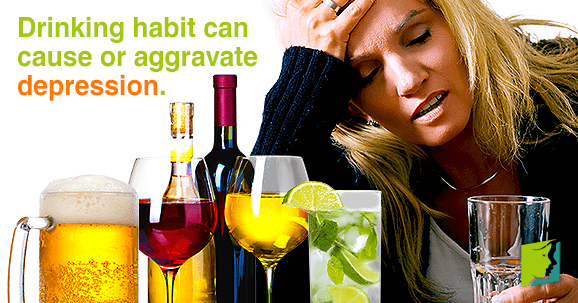Depression affects many people and can have undesirable effects on everyday life. There are many different reasons that depression can occur, including hormonal, genetic, and lifestyle factors. The good news is that the lifestyle factors can be controlled, and the bad habits that could be causing depression can be broken and replaced with new ones. Keep reading to learn more about habits that have been linked to depression.

What Is Depression?
Depression is an enduring feeling of sorrow or emptiness, often leaving the victim with a profound sense of hopelessness. The clinical condition differs from the ordinary sadness that is felt after a distressing event in that it does not go away on its own. Depression can make daily life very difficult, and performing simple tasks can often leave the person feeling exhausted. Symptoms of depression can include fatigue, feelings of worthlessness, and concentration problems.
Bad Habits Linked to Depression
Part of the cause of depression can often lie in a number of common bad habits. Of course, these habits do not result in depression for everyone, but in the people who do suffer from depression, trying to break these habits could lead to a happier state of being.
Lack of Sleep
Not having enough sleep can increase cortisol levels. Cortisol is the hormone associated with stress, and too much of it can lead to irritability and unreasonable thoughts. Unhealthy sleep patterns can be caused by consuming caffeine or alcohol before bed, sleeping in a hot or noisy bedroom, and having an irregular sleep pattern.
Sedentary Lifestyle
Physical activity encourages the release of the mood-improving neurotransmitters serotonin and endorphines. Therefore, a lifestyle that lacks physical activity means a person does not benefit from the mood-elevating effects of these hormones.
Too Much Alcohol
Alcohol is a depressant, so a drinking habit can cause or aggravate depression. It can sometimes seem appealing to use alcohol as an escape from undesirable moods or as a way to socialize, but this effect is short-term. One of the long-term effects of alcohol can be depression.
Social Withdrawal
Although it can be tempting to avoid social interaction when suffering from depression, withdrawal can be very harmful, as it easily deepens symptoms. Social stimulation is a basic human need, and lack of it can negatively impact health.
Habits can be challenging to break, especially long-term ones, but taking steps toward changing the above-mentioned behaviors will have a positive effect on your psychological well-being. Depression is a difficult disorder to deal with, but making a few changes could mean preventing it or eliminating it completely.
For more information on depression and how to treat it, follow the links below.
Sources
- Harvard Medical School. (2008). Adopt Good Sleep Habits. Retrieved August 26, 2014, from http://healthysleep.med.harvard.edu/need-sleep/what-can-you-do/good-sleep-habits
- Harvard Medical School. (2008). Sleep and Mood. Retrieved August 26, 2014, from http://healthysleep.med.harvard.edu/need-sleep/whats-in-it-for-you/mood
- National Health Service UK. (2013). Clinical depression. Retrieved August 26, 2014, from http://www.nhs.uk/Conditions/Depression/Pages/Introduction.aspx
- National Health Service UK. (2014). Clinical depression - Causes. Retrieved August 26, 2014, from http://www.nhs.uk/Conditions/Depression/Pages/Causes.aspx
- National Health Service. (2014). Exercise for depression. Retrieved August 26, 2014, from http://www.nhs.uk/conditions/stress-anxiety-depression/pages/exercise-for-depression.aspx
- National Health Service UK. (2014). Tips for coping with depression. Retrieved August 26, 2014, from http://www.nhs.uk/Conditions/stress-anxiety-depression/Pages/dealing-with-depression.aspx
- University of California Los Angeles. (2013). UCLA neuroscientist's book explains why social connection is as important as food and shelter. Retrieved August 26, 2014, from http://newsroom.ucla.edu/releases/we-are-hard-wired-to-be-social-248746
- University of Maryland Medical Center. (2012). Depression. Retrieved August 26, 2014, from http://umm.edu/health/medical/altmed/condition/depression



